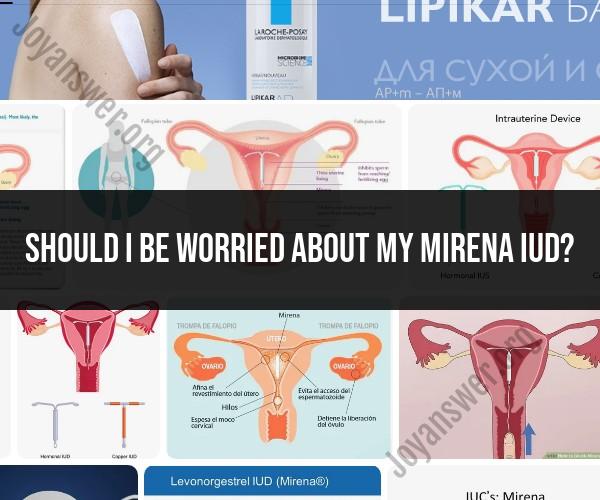Should I be worried about my Mirena IUD?
I am not a doctor, but I can provide you with some general information. It's important to consult with a healthcare professional for advice tailored to your specific situation.
Mirena is an intrauterine device (IUD) that releases a low dose of levonorgestrel, a synthetic hormone, to prevent pregnancy. While Mirena is a highly effective form of contraception and is generally well-tolerated by many women, there can be concerns and considerations that vary from person to person. Here are some common concerns and considerations associated with Mirena:
Insertion Pain: Some women may experience discomfort or pain during the insertion of the Mirena IUD. This can vary from person to person, and the level of discomfort may depend on factors such as pain tolerance and individual anatomy.
Expulsion: There is a small risk of the IUD being expelled from the uterus. This is more common shortly after insertion. If you experience unusual pain or if you can feel the strings of the IUD, it's important to contact your healthcare provider.
Infection Risk: While rare, there is a risk of pelvic infection during the first few weeks after insertion. Symptoms may include pelvic pain, fever, or abnormal vaginal discharge. If you experience these symptoms, it's important to seek medical attention promptly.
Perforation: In extremely rare cases, the IUD may perforate the uterine wall during insertion. This is a serious complication that requires immediate medical attention.
Changes in Menstrual Patterns: Some women may experience changes in their menstrual patterns, including lighter periods, irregular bleeding, or the absence of menstruation. This is a common side effect of hormonal IUDs.
Hormonal Side Effects: The levonorgestrel in Mirena is a hormone, and some women may experience hormonal side effects, such as mood changes, headaches, or breast tenderness.
Expulsion of IUD During Menstruation: Some women may unknowingly expel the IUD during their menstrual period. Regularly checking for the presence of the IUD strings is recommended.
If you have any concerns or are experiencing symptoms that you believe may be related to your Mirena IUD, it's crucial to contact your healthcare provider promptly. They can provide guidance based on your individual health history and situation. Regular follow-up appointments with your healthcare provider are also recommended to ensure the IUD is in the correct position and functioning as intended.
Mirena is a highly effective and safe form of contraception for most women. However, like any medication or medical device, there are some potential risks and side effects associated with its use. If you have any concerns about your Mirena IUD, it is important to talk to your doctor.
Should I be worried about my Mirena IUD?
Most women with Mirena IUDs do not experience any serious problems. However, there are a few things to be aware of:
- Perforation: The IUD can sometimes perforate the uterus, which means it can poke through the wall of the uterus and into the abdomen. This is a rare complication, but it can be serious and may require surgery.
- Expulsion: The IUD can also be expelled from the uterus, which means it can fall out. This is more likely to happen in the first few months after insertion, but it can happen at any time.
- Infection: The IUD can also cause an infection, which can be serious if it is not treated promptly.
- Pelvic inflammatory disease (PID): PID is an infection of the female reproductive organs. It can be caused by bacteria from the vagina or cervix that travel up into the uterus, fallopian tubes, and ovaries. PID can be serious and can lead to infertility.
What are common concerns associated with Mirena IUD?
In addition to the more serious risks listed above, there are also some common concerns associated with Mirena IUD, such as:
- Irregular bleeding: Many women experience irregular bleeding or spotting after Mirena insertion. This usually goes away after a few months, but it can persist in some women.
- Pain: Some women experience pain or cramping after Mirena insertion. This usually goes away after a few days, but it can persist in some women.
- Mood changes: Some women experience mood changes, such as depression or anxiety, after Mirena insertion. These changes are usually mild and go away after a few months, but they can be more severe in some women.
- Weight gain: Some women experience weight gain after Mirena insertion. The cause of this weight gain is not fully understood, but it may be related to the hormones in the IUD.
How can concerns about Mirena IUD be addressed?
If you have any concerns about your Mirena IUD, it is important to talk to your doctor. They can help you assess your risk of complications and answer any questions you have about the IUD. They can also provide treatment for any side effects you are experiencing.
Here are some additional tips for addressing concerns about Mirena IUD:
- Keep track of your symptoms. This will help you identify any changes that may be related to the IUD.
- Talk to other women who have used Mirena IUD. This can help you get a sense of what to expect and whether the IUD is right for you.
- Be patient. It may take some time for your body to adjust to the IUD. If you are experiencing any side effects, give them a chance to go away before you decide to have the IUD removed.
Remember, you are not alone. Many women have concerns about their Mirena IUD. Talking to your doctor and getting informed can help you make the best decision for your health.












